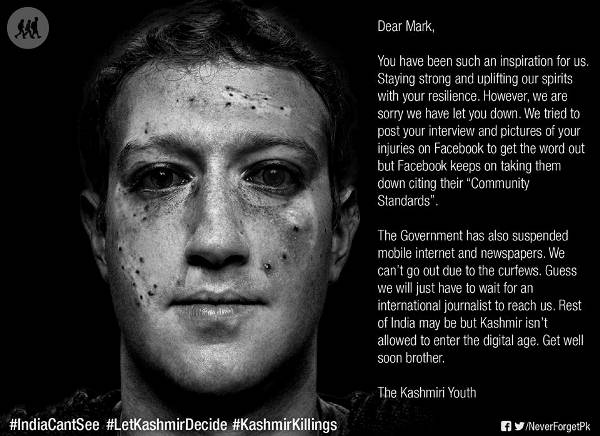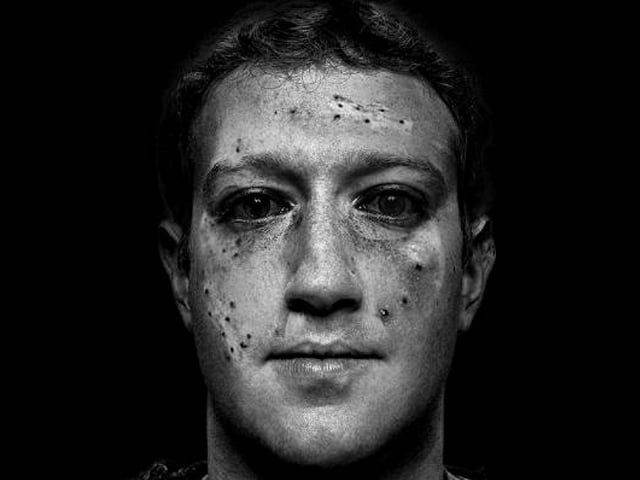On top of that, Facebook had the audacity to censor these stories in the name of ‘Community Standards.’ We wanted to do a campaign against the use of pellets. Narendra Modi was an obvious choice as he is the prime minister. Sonia Gandhi was chosen because her ally, Omar Abdullah, sanctioned the use of these guns in 2010. It is their collective policies that are resulting in these atrocities. Mark Zuckerberg was selected to highlight the consequences of internet censorship.
We chose Bollywood celebrities because in India they are more than just film stars. They are cultural icons. They are worshipped by their fans and have, in the past, put their weight behind rights issues. Many celebrities were vocal about stricter laws against rape and also active in the economic suppression of farmers, resulting in their suicides.
Then why the silence on Kashmir?
Their movies do business in Kashmir. They go and shoot their films in Kashmir and earn massive revenues. Don’t they feel anything for the people who live there?
We chose these people as a means to create empathy. We live in a sad world where we have to come up with creative, and at times, extreme ways just to make people pause for a second, look, think and reflect.
 "Sorry Mark but Facebook wont let us post about what happened to you."Click on the picture to read more about Facebook censorship on Kashmir.
"Sorry Mark but Facebook wont let us post about what happened to you."Click on the picture to read more about Facebook censorship on Kashmir. Dear Shahrukh, The Army you glorify hunts down unarmed Kashmiri children. Click on the picture to read more about what happened to Hamid Nazir here.
Dear Shahrukh, The Army you glorify hunts down unarmed Kashmiri children. Click on the picture to read more about what happened to Hamid Nazir here.[caption id="" align="alignnone" width="600"] Dear Modi ji, the laws of your democracy are making Kashmiris silent and blind.Kashmiri doctors lament injuries by pellets in protests. To read more click on the picture.[/caption]
[caption id="" align="alignnone" width="600"] Dear Amit Ji, your silence is killing Kashmiri sons and daughters.Click on the picture to read more about the late Gowhar Nazir.[/caption]
[caption id="" align="alignnone" width="600"] Dear Sonia ji you bear the burden of sanctioning the use of pellet guns.Click on the picture to read about hospitals Flooded with injured youngsters in a brutalised Kashmir.[/caption]
 Dear Virat, your silience is killing sporting dreams of KashmirisClick on the picture to read more about Sahil Zahoor.
Dear Virat, your silience is killing sporting dreams of KashmirisClick on the picture to read more about Sahil Zahoor. Dear Aishwariya, would you speak for someone else's four year old?Click on the picture to read about Zuhra Majeed.
Dear Aishwariya, would you speak for someone else's four year old?Click on the picture to read about Zuhra Majeed. Dear Alia, more students are turning blind every year in Kashmir. Click on the picture to read more about Insha Mushtaq.
Dear Alia, more students are turning blind every year in Kashmir. Click on the picture to read more about Insha Mushtaq.[caption id="" align="alignnone" width="600"] Dear Saif, Kashmir is losing hope in you.Click on the picture to read about Umar Nazir.[/caption]
[caption id="" align="alignnone" width="600"] Dear Kajol, would you speak for a fellow mother?Click on the picture to read more about Tamanna.[/caption]
 Dear Hrithik, would Krish save Kashmiri children from a tyrant army?Click on the picture to read more about Imaad Ahmad.
Dear Hrithik, would Krish save Kashmiri children from a tyrant army?Click on the picture to read more about Imaad Ahmad.That is why we made them look like victims of the same brutalities Kashmiris suffer. The letters, written alongside every picture, were drafted by us but the stories in the letters are real. The names of the victims are real. We wanted to avail every opportunity we got to connect the audience to the struggle of the Kashmiri people - to read and learn as much as possible about their plight; that is why we added links to the actual news stories about these victims with every picture.
We used 11 posters and we tried to highlight different stories and issues. Some talk about how the forces attack non-protestors as well as how age is not a factor, how they shoot at point-blank range, how doctors are harassed in hospitals, how patients are denied medical treatment and arrested from hospitals and how the forces – despite all this – enjoy complete immunity because of draconian laws like the Armed Forces Special Powers Act, which makes a mockery out of India’s claim to be a secular democracy.
We are an organisation based in Pakistan, but we do not carry any misplaced sense of nationalism. For this album, our audience, apart from the people addressed in the posters, is the world at large.
Unfortunately, many Pakistanis and Indians carry a misplaced sense of nationalism. There are those who see the human side of it, and then there are those who take this opportunity to play the blame game and not agree that human life and freedom is most precious.
But our main audience were and are, of course, the Kashmiris themselves.
If nothing else, this is a way to tell them that we are on their side - that they are not alone and that the world is listening, trying, fighting for them too.
Even before launching the campaign we tried to contact as many Kashmiri activists we could and got their approval for the campaign. We did not want to undermine their struggle or be insensitive to it. We are just amplifiers, the voice we are amplifying is that of the Kashmiri people. The positive response we have received from our Kashmiri brothers and sisters is very encouraging. If we are able to add even an iota to their strength, we would consider our work done. But that will not absolve the celebrities; whom we have addressed in these posters. We will wait for them to break their silence.
I believe people should realise that we live in the digital age. The best they can do is create awareness about the Kashmiri struggle. All mediums are open; posters, poems, songs, ads, short films.
How you can help us take this campaign forward is by sharing stories of real victims with us so we can amplify them. But whichever way you design your campaign, you need to realise you are not someone’s mouthpiece, you are just an amplifier. All we need to agree on is one simple point, #LetKashmirDecide.
Note: Never Forget Pakistan is a welfare society which works to create positive narratives and do advocacy on human rights. We do not suffer from any misplaced sentiment of nationalism. We speak against abuses be it by any state or government including our own.
Campaign Objective:
You know these faces. Does that make the tragedies more important? The stories in the letters are real. The names signed under the letter are real. The victim you see in the picture is not real. But do you really care what the profile of the victim is in order for you to sympathise and empathise with them, for you to speak for them? Why do we need to glamourise a tragedy in order for people to pay attention?
Have we all become that numb?
This campaign is designed to highlight the atrocities and abuses carried out by the Indian Armed forces and Police who enjoy complete immunity under the Armed Forces Special Powers Act which has made a mockery of India’s claim to be a secular democracy.
Scores have been blinded, several killed and hundreds injured by what India describes as a ‘non-lethal’ weapon i.e. the pellet gun.
We condemn and lament the criminal silence and inaction of the Indian government and cultural icons of India. Furthermore, we strongly condemn the pick and choose policy of Facebook, which conveniently censors posts highlighting the plight of the Kashmiris and later excuses itself by calling the censorship a ‘mistake.’
This campaign is not about jingoism. It is about trying to create empathy. We live in a sad world where we have to present genuine tragedies in a creative way just to make people pause and think for a moment.
As advocates for human rights, we believe that Kashmir, independent of any force and influence from India and Pakistan, should have the right to determine its own identity and future.
Concept/Copywriting: Mohammad Jibran Nasir
Artwork: Murtaza Abbas / Batool Aqeel
Campaign: What if you knew the Victim? #IndiaCantSee by Never Forget Pakistan



COMMENTS
Comments are moderated and generally will be posted if they are on-topic and not abusive.
For more information, please see our Comments FAQ